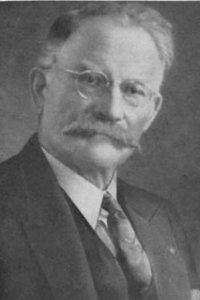
Eminent Farmer
County: Beadle
One of the pioneers in the field of growing soil-building crops was Albert R. Fryer of Doland. He was a firm believer in the agricultural conservation programs from the start and was laughed at by his neighbors when he started to grow sweet clover, which they considered a weed. He grew his first brome grass about the turn of the century. Fryer was deeply interested in experimentation and followed the work of the agricultural experiment station and of successful farmers closely. Although cash grain at first formed a principal source of income for Fryer, in later years he practiced diversified farming and livestock raising. He and his brother brought the first fullblood Percheron stallion to his section of the state. Fryer's part in cooperative enterprises is well known in the northeastern section of South Dakota. He served as president of the Farmers Elevator company of Doland. He was also president of the Belle Plaine telephone company and for several years was president and general manager of the Farmers Mutual Telephone company of La Delle. Fryer initiated the first petition for the first school. He helped build the Irving community church four miles from his farm. He was one of the early stockholders in the Northwestern Life Insurance company of Aberdeen and for years was president of the Spink County Farmers' Mutual Insurance Association. Fryer was born Dec. 20, 1863 in Rome, New York, and died at his home April 18, 1945. He was one of 10 children, eight of whom came to South Dakota. Fryer's schooling, which had begun in New York, continued in Woodstock, Illinois. The Fryer family arrived at Frankfort, Dakota Territory, March 13, 1886, settling in what became Harrison Township, Spink County, as named by Fryer. In 1891 he married Louisa Heintz, another pioneer of the vicinity. They raised 10 children, nine of whom have attended and graduated from South Dakota State College. The chief hobbies of Fryer were reading and writing of history, and collecting Indian and pioneer day relics.

